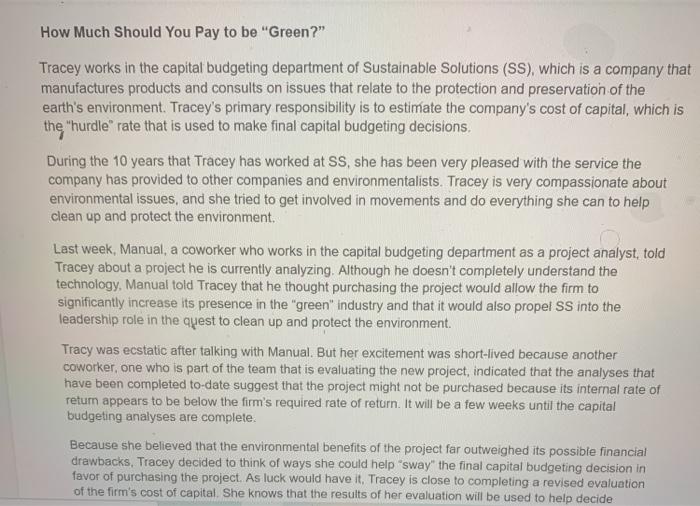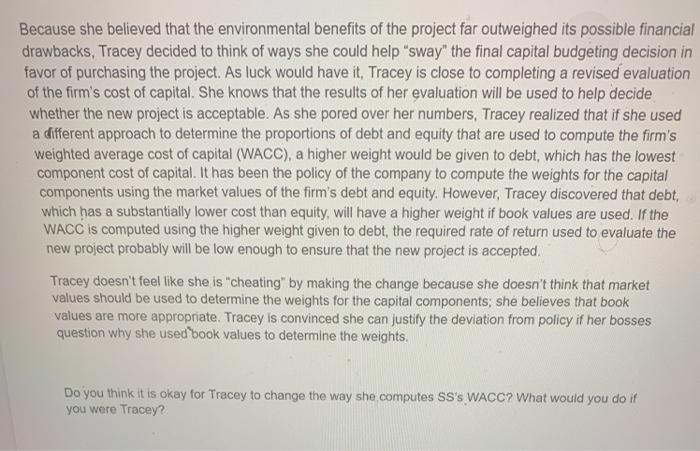Answer the following questions in an initial post of approximately 200 words: Do you think it is okay for Tracey to change the way she computes SS's WACC? What would you do if you were Tracey? Feel free to cite the textbook or pull in outside references (include a link) to support your conclusions. How Much Should You Pay to be "Green?" Tracey works in the capital budgeting department of Sustainable Solutions (SS), which is a company that manufactures products and consults on issues that relate to the protection and preservation of the earth's environment. Tracey's primary responsibility is to estimate the company's cost of capital, which is the "hurdle" rate that is used to make final capital budgeting decisions, During the 10 years that Tracey has worked at SS, she has been very pleased with the service the company has provided to other companies and environmentalists. Tracey is very compassionate about environmental issues, and she tried to get involved in movements and do everything she can to help clean up and protect the environment. Last week, Manual, a coworker who works in the capital budgeting department as a project analyst, told Tracey about a project he is currently analyzing. Although he doesn't completely understand the technology, Manual told Tracey that he thought purchasing the project would allow the firm to significantly increase its presence in the "green" industry and that it would also propel Ss into the leadership role in the quest to clean up and protect the environment. Tracy was ecstatic after talking with Manual. But her excitement was short-lived because another coworker, one who is part of the team that is evaluating the new project, indicated that the analyses that have been completed to-date suggest that the project might not be purchased because its internal rate of return appears to be below the firm's required rate of return. It will be a few weeks until the capital budgeting analyses are complete. Because she believed that the environmental benefits of the project far outweighed its possible financial drawbacks, Tracey decided to think of ways she could help "sway" the final capital budgeting decision in favor of purchasing the project. As luck would have it, Tracey is close to completing a revised evaluation of the firm's cost of capital. She knows that the results of her evaluation will be used to help decide Because she believed that the environmental benefits of the project far outweighed its possible financial drawbacks, Tracey decided to think of ways she could help sway" the final capital budgeting decision in favor of purchasing the project. As luck would have it, Tracey is close to completing a revised evaluation of the firm's cost of capital. She knows that the results of her evaluation will be used to help decide whether the new project is acceptable. As she pored over her numbers, Tracey realized that if she used a different approach to determine the proportions of debt and equity that are used to compute the firm's weighted average cost of capital (WACC), a higher weight would be given to debt, which has the lowest component cost of capital. It has been the policy of the company to compute the weights for the capital components using the market values of the firm's debt and equity. However, Tracey discovered that debt, which has a substantially lower cost than equity, will have a higher weight if book values are used. If the WACC is computed using the higher weight given to debt, the required rate of return used to evaluate the new project probably will be low enough to ensure that the new project is accepted. Tracey doesn't feel like she is "cheating" by making the change because she doesn't think that market values should be used to determine the weights for the capital components, she believes that book values are more appropriate. Tracey is convinced she can justify the deviation from policy if her bosses question why she used book values to determine the weights. Do you think it is okay for Tracey to change the way she computes SS'S WACC? What would you do if you were Tracey









